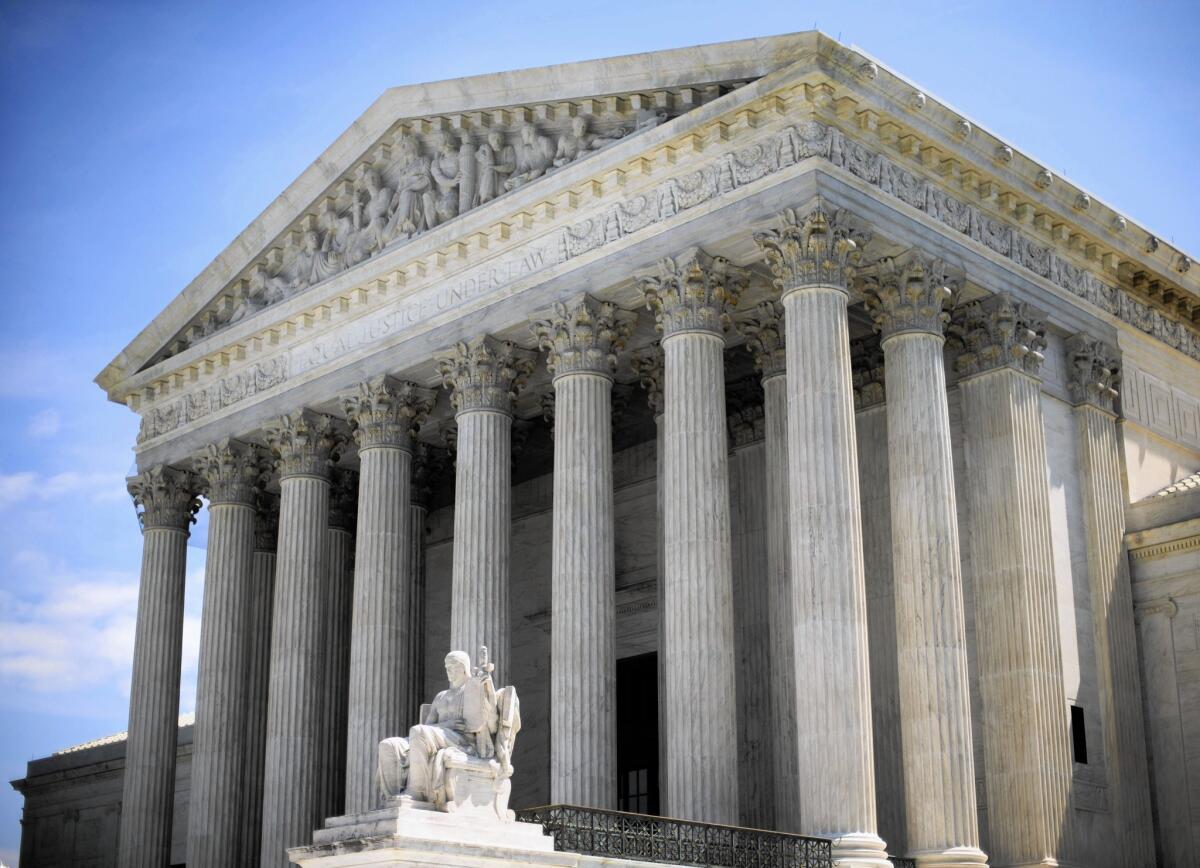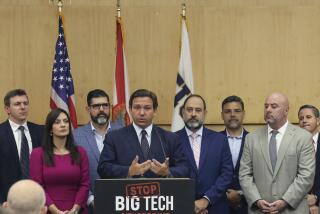Supreme Court may limit class-action lawsuits against tech industry

The Surpeme Court building
Reporting from washington â The U.S. Supreme Court justices, hearing arguments in a closely watched tech industry case, sounded poised Monday to limit mass lawsuits from people who sued after seeing false information about themselves online.
Led by Chief Justice John G. Roberts Jr., the courtâs conservatives said lawsuits should be limited to people who can show they were hurt in some way by inaccurate online data.
If the court ultimately rules that way, it would block or greatly shrink class-action claims, filed on behalf of millions of people, that have sent a scare through the tech industry.
The case of Spokeo vs. Robins asks a basic question about who can sue in an era of Web commerce in which countless transactions take place online.
Can millions of consumers join a class-action suit if a company allegedly violates provisions of a federal law, such as the measures that regulate credit information or prohibit unwanted phone calls and text messages? Or are these suits limited to people who can show they were actually harmed?
Spokeo, a âpeople search engineâ based in Pasadena, was sued in a class claim brought on behalf of Thomas Robins, a Virginia man who said his profile was entirely inaccurate.
He was described as married with children, in his 50s and with a graduate degree and a professional job. None of that was true. Robins said he was unemployed and unmarried.
The 9th Circuit Court of Appeals in San Francisco cleared his suit to go forward because the Fair Credit Reporting Act sought to protect consumers from inaccurate credit reports and authorized damages of $100 to $1,000 for violations.
Justice Elena Kagan said Robins appeared to have a strong claim.
âMost people would feel they had been harmed,â she said, if a company posted âfalse information about you.â And Congress clearly thought that was a problem. âDonât we owe them a little respect?â she asked, referring to members of Congress.
The courtâs liberal justices appeared to agree with her.
But Justices Antonin Scalia and Anthony M. Kennedy joined with the chief justice in suggesting that lawsuits must be limited to people who can show they suffered an actual injury.
Roberts cited the example of someone who is upset to find his unlisted telephone number posted online, but realizes that the number is wrong. How can such a person claim an injury under the telephone privacy act, he asked.
The justices will meet behind closed doors to vote on the case, and they are likely to issue a decision early next year.
Consumer and privacy advocates have rallied behind Robins and his class-action claim. They point to the growth of databanks that compile thousands of bits of information on every person, some of which is accurate and some not. And they cite the well-publicized security breaches that may expose the personal information of millions to hackers and thieves.
If the court makes class-action cases harder to bring, few individuals will take the trouble to challenge companies for violating their privacy if all they can recover is a small sum, the advocates say.
âWe think the loss of privacy is very serious. This is no time for the court to make it harder to bring lawsuits against companies that are making money for the data of individuals,â said Marc Rotenberg, president of the Electronic Privacy Information Center.
Last year, the Federal Trade Commission reported on nine data brokers (not including Spokeo) that collect, compile and sell vast amounts of personal information.
One broker claimed to have 3,000 data points on nearly every U.S. consumer, describing everything from shopping and personal habits to medical troubles and political leanings. Another claimed to have a billion profiles of people around the world. At the same time, the FTC said, most consumers have no way to check or confirm the information.
Consumer-rights advocates say class-action suits can enforce federal privacy protections and force data brokers to do more to ensure that their profiles of people are accurate.
âThe business community is urging the court to make a sweeping and pretty radical change in the law,â said Paul Bland, executive director of Public Justice.
The legal question involved is who has standing to sue. The Constitution says that federal courts have authority over âall cases, in law and equity, arising under this Constitution [and] the law of the United States.â
Since Robins sued Spokeo for violating the federal law on credit reports, he would appear to have standing as a plaintiff.
But the Supreme Court has said that âcasesâ refers to actual disputes in which a person or group can show a specific injury.
In 1992, for example, the court tossed out a suit by environmentalists who had accused the George H.W. Bush administration of failing to enforce protections for endangered species. Justice Scalia said the members of Defenders of Wildlife who sued could point to no personal harm they had suffered.
The case of Spokeo vs. Robins poses a major question of whether Congress can create legal rights for Americans â such as a protection against inaccurate credit reports â that would then give people a right to sue in federal court.
Twitter: @davidgsavage
More to Read
Inside the business of entertainment
The Wide Shot brings you news, analysis and insights on everything from streaming wars to production â and what it all means for the future.
You may occasionally receive promotional content from the Los Angeles Times.











